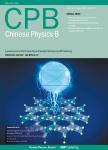Complex network perspective on modelling chaotic systems via machine learning
Complex network perspective on modelling chaotic systems via machine learning作者机构:Institute of Information Economy and Alibaba Business CollegeHangzhou Normal UniversityHangzhou 311121China College of ScienceUniversity of Shanghai for Science and TechnologyShanghai 200093China Business SchoolUniversity of Shanghai for Science and TechnologyShanghai 200093China
出 版 物:《Chinese Physics B》 (中国物理B(英文版))
年 卷 期:2021年第30卷第6期
页 面:211-215页
核心收录:
学科分类:12[管理学] 1201[管理学-管理科学与工程(可授管理学、工学学位)] 07[理学] 081104[工学-模式识别与智能系统] 08[工学] 0805[工学-材料科学与工程(可授工学、理学学位)] 070201[理学-理论物理] 0835[工学-软件工程] 0704[理学-天文学] 0811[工学-控制科学与工程] 0702[理学-物理学] 0812[工学-计算机科学与技术(可授工学、理学学位)]
基 金:supported by the National Natural Science Foundation of China (Grant No. 11805128) the Fund from Xihu Scholar award from Hangzhou City,the Hangzhou Normal University Starting Fund (Grant No. 4135C50220204098)
主 题:reservoir computing approach complex networks chaotic systems
摘 要:Recent advances have demonstrated that a machine learning technique known as reservoir computing is a significantly effective method for modelling chaotic systems. Going beyond short-term prediction, we show that long-term behaviors of an observed chaotic system are also preserved in the trained reservoir system by virtue of network measurements. Specifically, we find that a broad range of network statistics induced from the trained reservoir system is nearly identical with that of a learned chaotic system of interest. Moreover, we show that network measurements of the trained reservoir system are sensitive to distinct dynamics and can in turn detect the dynamical transitions in complex systems. Our findings further support that rather than dynamical equations, reservoir computing approach in fact provides an alternative way for modelling chaotic systems.



